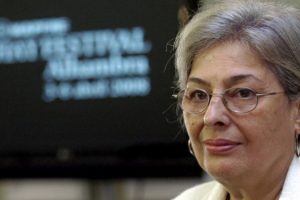In memoriam: Radwa Ashour, Egyptian novelist

Publishing house Shorouk marks birth anniversary of Egyptian novelist and critic Radwa Ashour by reissuing five of her books.
2015/06/12 Issue: 9 Page: 21
The Arab Weekly
Mona Anis
The publishing house Shorouk marked the anniversary of the birth of Egyptian novelist and critic Radwa Ashour by reissuing five of her books. Ashour’s death last December created waves of sadness among the community of writers in Egypt and beyond, especially in Palestine where she was much admired for her unwavering support of the struggle of the Palestinians and the right of return for those driven out of their homes in 1948.
In her last novel, The Woman from Tantoura: A Palestinian Novel, published in 2010 in Arabic and in 2014 in English, she dramatised the lives of those Palestinians on whose land the state of Israel was created.
Ashour had always considered herself to be a Palestinian as well as an Egyptian and that affinity was sealed when she married Palestinian poet Mourid Barghouti in 1970 and gave birth to their son Tamim in 1977. The anniversary of her birth was commemorated in a manner appropriate to the much-loved Ashour with poetry readings by Mourid and Tamim Barghouti.
The Barghoutis read poems mainly about Ashour to a packed main hall of the El-Sawy Culture Wheel in Cairo on June 2nd.
The elder Barghouti read the complete text, for the first time, of a long poem he had written for Ashour in 1973 when she travelled to the United States for her doctorate. It sounded like an elegy that had been written just a short while ago: “I wake up on a poem rising at dawn/asking me where you have gone./ I don’t weep./ I go to your bed,/ And find in it a poem, waking up,/saying good morning.”
Tamim Barghouti read a new poem in Egyptian vernacular Arabic that he had composed as an elegy for his mother. Entitled The Universe has Suddenly Closed in on Me, it included the lines: “Radwa Ashour is a proposal for better human beings./Her smile says I tried it, and it’s possible./And when they let her down/ I see the face of the morning is sad.”
Four of Ashour’s works reissued by Shorouk had been out of print for some time, while the fifth is the second part of her autobiography, left unfinished at the time of her death. The first part of the autobiography, Heavier than Radwa, was published in 2013.
The second part derives its title, The Scream, from the work of Norwegian artist Edvard Munch, whose well-known work The Scream (1893) exists in four versions in various media. Ashour wanted to have one of the prints on the cover of the second part of her autobiography, which she did not believe she would live to see published. This wish was granted by her publisher.
Ashour’s battle with illness and her extraordinary resilience in continuing to write and engage in public life during the battle was remarkable. A month before the January 25th Egyptian uprising in 2011, she was told she had to investigate a benign nerve sheath tumour behind her ear that she had been complaining about for some time.
She went to the United States in December 2010, where she was told that the tumour had degenerated into a form of cancer known as neurofibrosarcoma.
Between December 2010 and December 2014, Ashour had four head surgeries but still completed the first part of her memoir, continued to teach and supervise academic dissertations and participated in the revolutionary mobilisation in the streets as much as she was able.
By September 7, 2014, Ashour could not write anymore. Before putting her pen down for the last time, she wrote, “Writing is on my mind all the time but I dare not go near the computer or put pen to paper.”
She was a writer of immense gift, courage and integrity as her autobiography testifies. In both volumes, but perhaps especially the second, one can feel the tension between what is represented and what is not represented, or, as the late Edward Said put it, “between the articulate and the silent,” where silence itself is an aspect of style.
Novels by Radwa Ashour in English:
Granada: A novel, translated by William Granara, Syracuse University Press, 2003.
Siraj, translated by Barbara Romaine, University of Texas Press, 2007.
Spectres, translated by Barbara Romaine, Interlink Books, 2010.
The Woman from Tantoura, translated by Kay Heikkinen, American University Press in Cairo, 2014.
Blue Lorries, translated by Barbara Romaine, Bloomsbury Qatar Foundation, 2014.
Mona Anis is a Cairo-based journalist and literary critic.